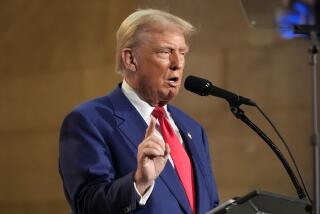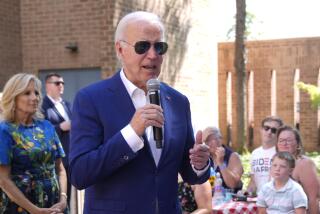Obama tries to reconnect with youthful supporters at Facebook town hall
Reporting from Palo Alto — Hoping to rekindle excitement among younger voters, President Obama spoke at a town-hall meeting hosted by Facebook on Wednesday and asked for help in beating back “radical” Republican budget proposals.
He sat on a stage next to Facebook founder Mark Zuckerberg, who served as moderator and funneled largely friendly questions to a president who makes extensive use of social media in reaching out to voters.
Zuckerberg confessed to being nervous, but the two bantered easily. Obama made a light reference to the 26-year-old’s billionaire status. In describing his tax plan, Obama said that he and “frankly, you, Mark,” can afford to pay “a little more in taxes.”
Taking questions submitted through Facebook and from an audience of company employees, Obama advised listeners not to get frustrated by protracted debates in Washington. He conceded that some of his 2008 voters might be asking why progress on many issues hasn’t come sooner. But he urged them not to give up on his agenda.
“I know that some of you who might have been involved in the campaign or been energized back in 2008, you’re frustrated that, gosh, it didn’t get done fast enough and it seems like everybody’s bickering all the time,” he said. “Just remember that we’ve been through tougher times before.”
Obama arrived in California on Wednesday for a two-day swing that will combine town-hall meetings with private appearances at high-dollar Democratic fundraising events.
On Wednesday night, he attended a pair of fundraisers at which guests paid up to the legal limit of $38,500. Proceeds were to be split between the Obama campaign operation and the Democratic National Committee.
Young voters seemed a special focus of Obama’s Facebook visit. He won election three years ago with help from throngs of young volunteers. Polls show that young voters still support him, but their enthusiasm has waned.
Last weekend, thousands of young activists came to Washington for an environmental conference, where they studied some of the organizing techniques Obama employed in his last campaign. They plan to use such methods to persuade the president to support clean-energy alternatives to nuclear power, natural gas and so-called clean coal.
Obama said Wednesday he welcomed youthful activism, even if he was the target.
“If you don’t give us a shove, if you don’t give the system a push, it’s just not going to change,” he said. “And you’re going to be the ones who end up suffering the consequences.”
The president also tried to pick up new allies. He told the Facebook audience that certain political goals were too tough to accomplish on his own. He said he needed broad public support to improve the educational system and to pass an immigration overhaul that would provide a path to legal status for those living here illegally.
And he used sharp rhetoric in laying out the stakes. Although he wants to cut the deficit by $4 trillion over the next dozen years, he said he would do so in a compassionate way, preserving the basic healthcare social safety net for the elderly and the poor. In contrast, he said, congressional Republicans are so intent on preserving tax cuts for the wealthy that they would compel seniors to pay more to buy health insurance.
“The Republican budget that was put forward, I would say, is fairly radical,” he said.
In a reference to House Budget Committee Chairman Paul D. Ryan (R-Wis.), Obama said: “I think that what he and the other Republicans in the House of Representatives also want to do is change our social compact in a pretty fundamental way.”
Obama’s appearance at Facebook headquarters was a kind of hat-tip to a social media site that is woven into the White House communications strategy.
White House advisors use Facebook — along with Twitter and photo-sharing websites — to connect with voters who might not be watching TV news or reading newspapers. After Robert Gibbs left as White House press secretary in February, he entered into discussions with Facebook about a possible job. Those talks appear to have fizzled.
Facebook’s reach carries a price, however. Before the town-hall meeting, White House advisors posted details on Obama’s Facebook page. More than 2,800 people commented.
Although there was ample appreciation for Obama, detractors also found their way to the online forum.
“I want to know why the president mistakenly thinks that the methods for establishing the statist-communist revolutions of Russia, China and South America will work here in America,” one person wrote.
More to Read
Sign up for Essential California
The most important California stories and recommendations in your inbox every morning.
You may occasionally receive promotional content from the Los Angeles Times.










